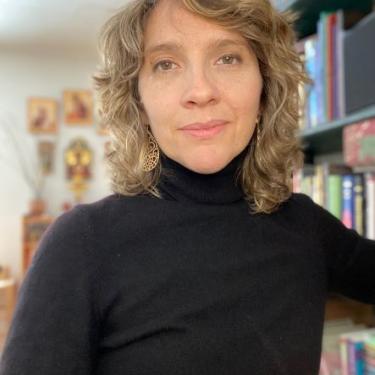
Talia Maria Sheehan is our Woman of the Week, nominated for her multifaceted work in Orthodox music and her role as co-founder of Artefact Institute. You see her here with her mother, grandmother, and a daughter; in pages from her high school yearbook; and with her husband and seven daughters. We asked her to tell you about her family's generational history in the world of music, and what that looks like for her today:
"It’s so hard to recognize that we’re born into a particular world. And it’s even harder to appreciate it while we’re in it. It takes zooming out into outer space sometimes and seeing that world from the outside to really see it for the miracle it is. Well, I am currently in outer space. Because it’s really only as I sit here, writing this feature that I see the beautiful world where I was born and have been living my life in all its glory. I was born into a world of strong, pioneering, long-lived, musical women, and a world of robust, active, open musical institutions.
"I have been surrounded my whole life by countless examples of female individualism situated in stable institutions. I am the product of a stable, loving family, a robust public school music program, and a vibrant and principled church music community. And for my formative years, in all of those places, strong, intelligent, caring, creative women were in roles of authority.
"I am actually a fourth-generation American female church musician. My great-grandmother Ethel, whom I knew well and loved—and who lived to be 100—was the first female elder in the Philadelphia Presbytery, led tent-revival hymn-sings, and played organ for worship services. My grandmother Miriam—who just turned 100 last month and is on track to surpass her mother in years—was the church historian and a Sunday school music teacher for decades, loved and known by all as “The Music Lady.” My mother Susan, also an elder, sang in her church choirs for 70 years, as well as school and community choirs, and served on and chaired Music and Worship committees. (And my eldest daughter, Miriam, is currently employed as a soprano section leader at a church in her college town, so that makes her the fifth generation.) The director of music at my childhood church was herself a strong, principled woman. Only my best was good enough for worship. She encouraged me to participate, to take responsibility, but she never lied to me if I didn’t do my best.
"My public school had a huge music program, and I participated in absolutely everything I possibly could. My school directors were talented and dedicated and I had an awesome experience. But it was my private lessons during my school days that really stood out. I was blessed with two incredibly strong women mentors. My piano teacher, who was also my middle school chorus teacher, was a pianist of the Russian school: exacting, inspiring, refined, a Diana figure. I will always remember her admitting to me that she decided to learn and perform Chopin’s Fantasie Impromptu for one of our studio recitals so that she could force herself to to face her fears and grow. I vowed then that I would be a teacher like her, and never put my students in a place that I wasn’t willing go myself. My voice teacher, whose voice was big enough for the Met and whose heart was bigger, worked tirelessly in the arts as an African-American woman in our rural town, facing quiet everyday racism but unfailingly generous with her artistry nevertheless. She took me to her own voice teacher one time, excited to show me how she learned. This was an example I vowed to follow as well. Under their coaching I programmed, produced, and performed a solo recital in my junior year and a duet recital with a fellow student in my senior year, and from there went on to study music in college.
"Looking back I can almost see my childhood as cosmically engineered to produce the extraordinary life I enjoy today. I am a church musician, I am a music educator, I am a leader, and, somewhat incomprehensibly even for me, I am the mother of seven daughters. The Force of the Female, as it were, is strong with me. Never, though—and I mean NEVER—let me give you the impression that my blessings have been a result of exclusively female strength and wisdom. Because there is no dance without the partner, no movement without resistance, no Me without The Other. My Other is an absolutely extraordinary man. Seeing him for who he is allows me a different way to be shot into outer space. I see him and I see me and I see the space between us. And seeing that means we can stay distinct while working within a larger and stable structure, towards a shared goal—very much like my beautiful women mentors did in their stable institutions. This understanding has led me to gather some very profound insights into the nature of community and culture, which I will share with you in my next piece."
Axia!
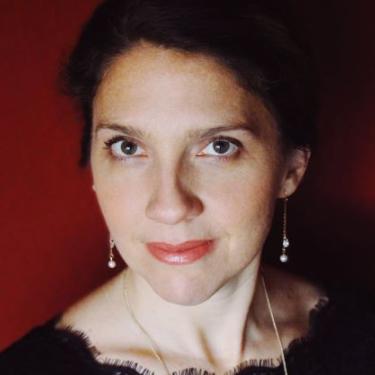
Our Woman of the Week is Talia Maria Sheehan, nominated for her roles as a church musician and co-founder of Artefact Institute. You see here teaching at St. Tikhon, singing in the Grammy-nominated St. Tikhon choir at the Temple of Dendur at the Metropolitan Museum of Art in New York City, and preparing for and enjoying an Artefact Institute feast. We asked her to tell you about Artefact Institute and the craft of culture:
"I wanted to be an astronomer when I was a little girl. The idea that something that I could perceive with my body (spirals, waves, clouds, momentum) could be consistent on the incomprehensibly large cosmic scale made me giddy with delight. It still does. As a teen I used to rejoice in observing patterns that were true on multiple levels of analysis. Then I learned the word for it. The word is fractal. And I love it so much. It’s a feeling of alignment across multiple levels that I have when I feel my life is “good.” My mind and feelings are aligned with my body, which is aligned with my household, which is aligned with my community, which is aligned with my culture. Fractals!
"In my adolescence interest in astronomy gave way to interest in music. And why not!? Music is so abstract, and yet so patterned, but we can never really make music mean something. It’s ephemeral, but it can hold our attention against our wills, even after it’s over. It can align and move the hearts of thousands of people simultaneously, billions over time and distance. Music takes simple elements and arranges them into an infinite number of possible patterns, for which we humans have an inexhaustible appetite. In that way a piece of music is like a person. Cosmically unique, fleeting, and at the same time, somehow, eternal. And though so abstract, music demands to be executed in social contexts. Up until the last century, no musician could perform alone and have her art delivered anonymously to an audience. And even with all our digital technology, most recording artists’ talents still need to be legitimized with live performances. Music just can’t happen without a listener—even if the only listener is the performer himself. And so, like spoken language, music is fundamentally social in nature. And this seems to be why music has always been humanity’s art of choice for defining and bonding cultures. I’m certainly biased, but I think all that makes music the Best Art.
"I teach voice to individuals as well as to ensembles. But I use the same methods with both. Because (no matter what conservatory faculty say) ensemble singing and solo singing aren’t in conflict. They’re just on different levels of resolution. You have to balance as many different internal demands as a soloist as you do external demands in an ensemble. So, what makes you a good individual musician also makes you a good ensemble musician. Plus ensemble music making is a powerful and easy way to have to a collective transcendent experience that doesn’t erase individuality. And it’s a positive feedback loop. The better your ensemble is, the better an individual musician you want to be, which makes your ensemble better, which makes you individually better. It can improve at a dizzying pace! And that, frankly, is my drug of choice.
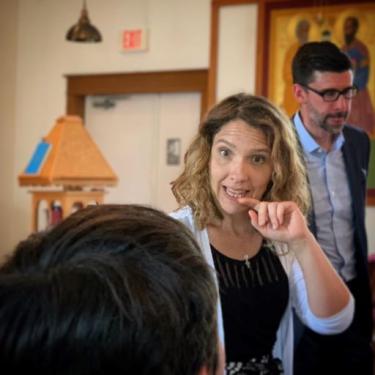
"Through the years my husband and I found that wherever we were working to improve and strengthen music, culture was getting stronger there too. We realized that it was possible to improve culture by working to improve music. So we formed Artefact Institute—a collective of artists that includes storytellers, musicians, producers, designers, and craftsmen—in an effort to start articulating and teaching the technique of culture-creation. Individual church communities proved to be the ideal scale at which to focus this work: big enough to have collective resources, small enough for the whole community to share in the experience. In that work a pattern kept emerging across levels of resolution (another fractal!) which has become the fundamental structure of all the work we do: The Common Vision, The Common Work, and The Common Feast. Artefact Institute helps communities create culture by helping them explore and organize their values and goals within this pattern. Our team of culture-creators then helps communities create an event where everyone gets to articulate the Vision, do the Work, and celebrate the Feast. And with that event a shared culture is created.
"We started Artefact Institute at the end of 2019 and then the pandemic hit. And community-wide events were impossible. But local culture didn’t disappear. It just got smaller for a time, and so did our focus working with the pattern. We scaled down from the community to the household and from the ensemble to the individual. During the pandemic Artefact Institute produced two household ritual orders—one for Christmas Dinner and one for a Paschal Home Feast—to move the Vision, Work, and Feast into the home for those Holy Days. And we moved from ensemble music making to individual music making, offering coaching for voice, conducting, and composition. The Christmas Dinner and Paschal Home Feast were celebrated in many homes across the world (including our own) and offered isolated people a sense of belonging and alignment when they missed it most. And our music students participated in both virtual and in-person performances and grew as individuals even though they missed their communities. But for everything we did in the scaled-down Covid world, there were always the three parts: the Common Vision, the Common Work, and the Common Feast. And so even in Covid we could build and strengthen culture. As we emerge out of the pandemic, we have our sights set on larger scale culture-creation once again. But we know that every level of the fractal needs attention for there to be alignment. For it to be good...and true, and beautiful."
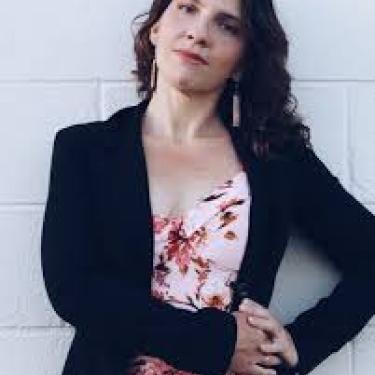
Talia Maria Sheehan is our Woman of the Week. As always we asked her to tell you about her morning routine:
"Every day, right when I wake up, I force myself to stay in bed for a few minutes. I’m the type that wants to jump out of bed and get a head start on freaking out about what isn’t done and what still has to be done and what has been done wrong. I’m good at that. So instead, this is my rule. I lie in bed. I lie in bed and notice things. Important things. I notice that I’m awake. I notice my limbs. I notice that I’m not in pain. I’m safe. I’m warm. I’m lying next to the love of my life. I can see the dawn. I know all my children and they know me. I have a job. I have friends and family. I’m happier and better when I start my day remembering how awesome these things are. And it helps me appreciate that I can still experience them.
"Then my love and I kiss good morning first and ask each other if we slept okay. I then get up and drink coffee in a clean kitchen. My love makes coffee the night before in our programmable coffee maker so that it’s hot and fresh when we get up. And the kitchen gets cleaned the night before by whoever didn’t make dinner that night. This way the morning can be peaceful. Sometimes I even work out and take a sauna. (Yes, we have a sauna! It’s the size of a broom closet, but it gets up to 190F in 30 minutes. It’s my escape, my medicine, and my therapy.)
"When the girls wake up (we have seven, and five still live at home), we say good morning first. Always hugs and kisses first. If someone wakes up and makes a demand or complains first they get to try again. If anyone is particularly grouchy they get an extra long hug. (It takes 20 seconds for a hug to start to trigger a dopamine release.) That’s the best way to start a day. Then they go off and make their breakfasts and lunches and use the sinks and mirrors and hairdryers and toilets and showers and try not to argue too much.
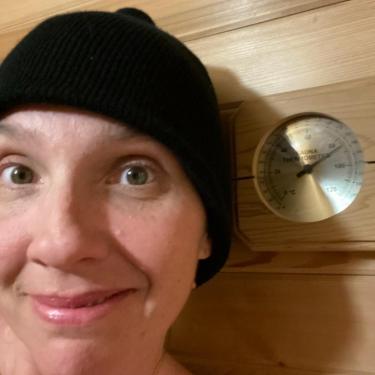
"We send girls to three different schools (four if you count college, but we don’t drive her there), and my love and I share the job of the daily school commute for two of them. The other three get bussed in an minivan by the local district. But their van driver is the most cheerful, wonderful, strong, resilient, retired lady dairy farmer. Her name is Marge. She is incomparable and we adore her. We send the youngest three off with Marge and I drive the older two to their two schools. It’s a long time in the car, one hour in the morning for me and one hour in the afternoon for my love. I listen to a LOT of podcasts.
"Then I go start my work of helping people to sing, which is, astonishingly, what I do for a living. I help them sing to God, sing to each other, sing to strangers, sing together, sing alone. All sorts of people: everyone from small children to retirees. There are plenty of other things I have to do in a day where my work is helping people to sing. And every day has problems. Sometimes they’re big problems. But nearly every single one of them is a problem I chose. Problems I wanted to have. They’re still problems. But I love my problems."
Thank you, Talia!


